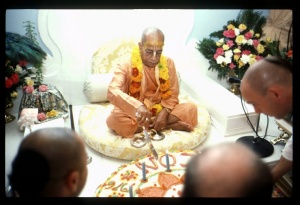NOI 9: Difference between revisions
No edit summary |
(Vanibot #0054 edit - transform synonyms into clickable links, which search similar occurrences) |
||
| Line 16: | Line 16: | ||
<div class="synonyms"> | <div class="synonyms"> | ||
''vaikuṇṭhāt'' | ''[//vanipedia.org/wiki/Special:VaniSearch?s=vaikuṇṭhāt&tab=syno_o&ds=1 vaikuṇṭhāt]'' — than Vaikuṇṭha, the spiritual world; ''[//vanipedia.org/wiki/Special:VaniSearch?s=janitaḥ&tab=syno_o&ds=1 janitaḥ]'' — because of birth; ''[//vanipedia.org/wiki/Special:VaniSearch?s=varā&tab=syno_o&ds=1 varā]'' — better; ''[//vanipedia.org/wiki/Special:VaniSearch?s=madhu&tab=syno_o&ds=1 madhu]-[//vanipedia.org/wiki/Special:VaniSearch?s=purī&tab=syno_o&ds=1 purī]'' — the transcendental city known as Mathurā; ''[//vanipedia.org/wiki/Special:VaniSearch?s=tatra&tab=syno_o&ds=1 tatra] [//vanipedia.org/wiki/Special:VaniSearch?s=api&tab=syno_o&ds=1 api]'' — superior to that; ''[//vanipedia.org/wiki/Special:VaniSearch?s=rāsa&tab=syno_o&ds=1 rāsa]-[//vanipedia.org/wiki/Special:VaniSearch?s=utsavāt&tab=syno_o&ds=1 utsavāt]'' — because of the performance of the rāsa-līlā; ''[//vanipedia.org/wiki/Special:VaniSearch?s=vṛndā&tab=syno_o&ds=1 vṛndā]-[//vanipedia.org/wiki/Special:VaniSearch?s=araṇyam&tab=syno_o&ds=1 araṇyam]'' — the forest of Vṛndāvana; ''[//vanipedia.org/wiki/Special:VaniSearch?s=udāra&tab=syno_o&ds=1 udāra]-[//vanipedia.org/wiki/Special:VaniSearch?s=pāṇi&tab=syno_o&ds=1 pāṇi]'' — of Lord Kṛṣṇa; ''[//vanipedia.org/wiki/Special:VaniSearch?s=ramaṇāt&tab=syno_o&ds=1 ramaṇāt]'' — because of various kinds of loving pastimes; ''[//vanipedia.org/wiki/Special:VaniSearch?s=tatra&tab=syno_o&ds=1 tatra] [//vanipedia.org/wiki/Special:VaniSearch?s=api&tab=syno_o&ds=1 api]'' — superior to that; ''[//vanipedia.org/wiki/Special:VaniSearch?s=govardhanaḥ&tab=syno_o&ds=1 govardhanaḥ]'' — Govardhana Hill; ''[//vanipedia.org/wiki/Special:VaniSearch?s=rādhā&tab=syno_o&ds=1 rādhā]-[//vanipedia.org/wiki/Special:VaniSearch?s=kuṇḍam&tab=syno_o&ds=1 kuṇḍam]'' — a place called Rādhā-kuṇḍa; ''[//vanipedia.org/wiki/Special:VaniSearch?s=iha&tab=syno_o&ds=1 iha] [//vanipedia.org/wiki/Special:VaniSearch?s=api&tab=syno_o&ds=1 api]'' — superior to this; ''[//vanipedia.org/wiki/Special:VaniSearch?s=gokula&tab=syno_o&ds=1 gokula]-[//vanipedia.org/wiki/Special:VaniSearch?s=pateḥ&tab=syno_o&ds=1 pateḥ]'' — of Kṛṣṇa, the master of Gokula; ''[//vanipedia.org/wiki/Special:VaniSearch?s=prema&tab=syno_o&ds=1 prema]-[//vanipedia.org/wiki/Special:VaniSearch?s=amṛta&tab=syno_o&ds=1 amṛta]'' — with the nectar of divine love; ''[//vanipedia.org/wiki/Special:VaniSearch?s=āplāvanāt&tab=syno_o&ds=1 āplāvanāt]'' — because of being overflooded; ''[//vanipedia.org/wiki/Special:VaniSearch?s=kuryāt&tab=syno_o&ds=1 kuryāt]'' — would do; ''[//vanipedia.org/wiki/Special:VaniSearch?s=asya&tab=syno_o&ds=1 asya]'' — of this (Rādhā-kuṇḍa); ''[//vanipedia.org/wiki/Special:VaniSearch?s=virājataḥ&tab=syno_o&ds=1 virājataḥ]'' — situated; ''[//vanipedia.org/wiki/Special:VaniSearch?s=giri&tab=syno_o&ds=1 giri]-[//vanipedia.org/wiki/Special:VaniSearch?s=taṭe&tab=syno_o&ds=1 taṭe]'' — at the foot of Govardhana Hill; ''[//vanipedia.org/wiki/Special:VaniSearch?s=sevām&tab=syno_o&ds=1 sevām]'' — service; ''[//vanipedia.org/wiki/Special:VaniSearch?s=vivekī&tab=syno_o&ds=1 vivekī]'' — who is intelligent; ''[//vanipedia.org/wiki/Special:VaniSearch?s=na&tab=syno_o&ds=1 na]'' — not; ''[//vanipedia.org/wiki/Special:VaniSearch?s=kaḥ&tab=syno_o&ds=1 kaḥ]'' — who. | ||
</div> | </div> | ||
Latest revision as of 00:12, 20 February 2024

A.C. Bhaktivedanta Swami Prabhupada
TEXT NINE
- vaikuṇṭhāj janito varā madhu-purī tatrāpi rāsotsavād
- vṛndāraṇyam udāra-pāṇi-ramaṇāt tatrāpi govardhanaḥ
- rādhā-kuṇḍam ihāpi gokula-pateḥ premāmṛtāplāvanāt
- kuryād asya virājato giri-taṭe sevāṁ vivekī na kaḥ:
SYNONYMS
vaikuṇṭhāt — than Vaikuṇṭha, the spiritual world; janitaḥ — because of birth; varā — better; madhu-purī — the transcendental city known as Mathurā; tatra api — superior to that; rāsa-utsavāt — because of the performance of the rāsa-līlā; vṛndā-araṇyam — the forest of Vṛndāvana; udāra-pāṇi — of Lord Kṛṣṇa; ramaṇāt — because of various kinds of loving pastimes; tatra api — superior to that; govardhanaḥ — Govardhana Hill; rādhā-kuṇḍam — a place called Rādhā-kuṇḍa; iha api — superior to this; gokula-pateḥ — of Kṛṣṇa, the master of Gokula; prema-amṛta — with the nectar of divine love; āplāvanāt — because of being overflooded; kuryāt — would do; asya — of this (Rādhā-kuṇḍa); virājataḥ — situated; giri-taṭe — at the foot of Govardhana Hill; sevām — service; vivekī — who is intelligent; na — not; kaḥ — who.
TRANSLATION
The holy place known as Mathurā is spiritually superior to Vaikuṇṭha, the transcendental world, because the Lord appeared there. Superior to Mathurā—Purī is the transcendental forest of Vṛndāvana because of Kṛṣṇa's rāsa-līlā pastimes. And superior to the forest of Vṛndāvana is Govardhana Hill, for it was raised by the divine hand of Śrī Kṛṣṇa and was the site of His various loving pastimes. And, above all, the superexcellent Śrī Rādhā-kuṇḍa stands supreme, for it is overflooded with the ambrosial nectarean prema of the Lord of Gokula, Śrī Kṛṣṇa. Where, then, is that intelligent Person who is unwilling to serve this divine Rādhā-kuṇḍa, which is situated at the foot of Govardhana Hill?
PURPORT
The spiritual world is three fourths of the total creation of the Supreme Personality of Godhead, and it is the most exalted region. The spiritual world is naturally superior to the material world; however, Mathurā and the adjoining areas, although appearing in the material world, are considered superior to the spiritual world because the Supreme Personality of Godhead Himself appeared at Mathurā. The interior forests of Vṛndāvana are considered superior to Mathurā because of the presence of the twelve forests (dvādaśa-vana), such as Tālavana, Madhuvana and Bahulāvana, which are famous for the various pastimes of the Lord. Thus the interior Vṛndāvana forest is considered superior to Mathurā, but superior to these forests is the divine Govardhana Hill because Kṛṣṇa lifted Govardhana Hill like an umbrella, raising it with His lotuslike beautiful hand to protect His associates, the denizens of Vraja, from the torrential rains sent by the angry Indra, King of the demigods. It is also at Govardhana Hill that Kṛṣṇa tends the cows with His cowherd friends, and there also He had His rendezvous with His most beloved Śrī Rādhā and engaged in loving pastimes with Her. Rādhā-kuṇḍa, at the foot of Govardhana, is superior to all because it is there that love of Kṛṣṇa overflows. Advanced devotees prefer to reside at Rādhā-kuṇḍa because this place is the site of many memories of the eternal loving affairs between Kṛṣṇa and Rādhārāṇī (rati-vilāsa).
In Caitanya-caritāmṛta (CC Madhya) it is stated that when Śrī Caitanya Mahāprabhu first visited the area of Vrajabhūmi, He could not at first find the location of Rādhā-kuṇḍa. This means that Śrī Caitanya Mahāprabhu was actually searching for the exact location of Rādhā-kuṇḍa. Finally He found the holy spot, and there was a small pond there. He took His bath in that small pond and told His devotees that the actual Rādhā-kuṇḍa was situated there. Later the pond was excavated by Lord Caitanya's devotees, headed first by the six Gosvāmīs, such as Rūpa and Raghunātha dāsa. Presently there is a large lake known as Rādhā-kuṇḍa there. Śrīla Rūpa Gosvāmī has given much stress to Rādhā-kuṇḍa because of Śrī Caitanya Mahāprabhu's desire to find it. Who, then, would give up Rādhā-kuṇḍa and try to reside elsewhere? No person with transcendental intelligence would do so. The importance of Rādhā-kuṇḍa, however, cannot be realized by other Vaiṣṇava sampradāyas, nor can persons uninterested in the devotional service of Lord Caitanya Mahāprabhu understand the spiritual importance and divine nature of Rādhā-kuṇḍa. Thus Rādhā-kuṇḍa is mainly worshiped by the Gauḍīya Vaiṣṇavas, the followers of Lord Śrī Kṛṣṇa Caitanya Mahāprabhu.